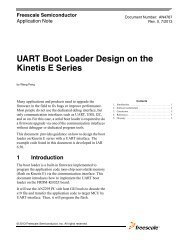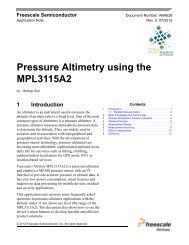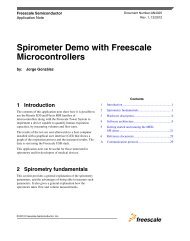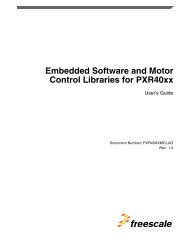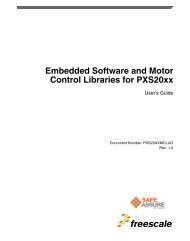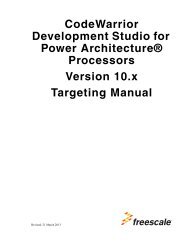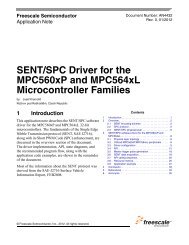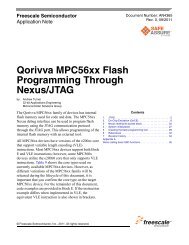VortiQa Platform Services Package (PSP) - Freescale Semiconductor
VortiQa Platform Services Package (PSP) - Freescale Semiconductor
VortiQa Platform Services Package (PSP) - Freescale Semiconductor
Create successful ePaper yourself
Turn your PDF publications into a flip-book with our unique Google optimized e-Paper software.
Fact Sheet<br />
<strong>VortiQa</strong> <strong>Platform</strong> <strong>Services</strong><br />
<strong>Package</strong> (<strong>PSP</strong>)<br />
Overview<br />
Over the past decade, the Linux ® OS<br />
has gained significant momentum<br />
in networking and other embedded<br />
applications development. However,<br />
networking software developers<br />
were unable to leverage Linux OS<br />
user space programming due to the<br />
performance impact on networking<br />
applications. The <strong>VortiQa</strong> <strong>PSP</strong> enables<br />
networking development in the<br />
Linux user space without impacting<br />
the performance of networking<br />
applications. Furthermore, the <strong>VortiQa</strong><br />
<strong>PSP</strong> provides application developers<br />
with a simplified interface to leverage<br />
the multicore QorIQ data plane<br />
acceleration architecture (DPAA).<br />
The <strong>VortiQa</strong> <strong>PSP</strong> is a middleware<br />
framework to develop and maintain<br />
networking applications in the Linux<br />
user space. This framework provides<br />
mechanisms to simplify Linux user<br />
space software development on<br />
<strong>Freescale</strong>’s QorIQ processors typically<br />
offered by data plane software<br />
development.<br />
QorIQ processors add substantial<br />
hardware-based acceleration<br />
capabilities that provide large<br />
performance gains in networking<br />
applications, such as DPAA and other<br />
acceleration engines. This provides<br />
offloading assistance in many of the<br />
demanding tasks encountered during<br />
packet processing, such as crypto<br />
algorithms, protocol parsing and<br />
Signaling<br />
Protocols<br />
and<br />
Management<br />
Applications<br />
packet queuing, buffer allocation and<br />
freeing, pattern search and regular<br />
expression engines. The <strong>VortiQa</strong> <strong>PSP</strong><br />
abstracts these hardware functions<br />
to allow for easier application<br />
developement in the Linux user space<br />
without requiring a deep knowledge<br />
of the hardware. Now, software<br />
developers can rapidly create and<br />
migrate networking applications to<br />
the user space without any impact on<br />
performance.<br />
<strong>Platform</strong> <strong>VortiQa</strong> Service <strong>Platform</strong> <strong>Package</strong> <strong>Services</strong> Architecture <strong>Package</strong> Block (<strong>PSP</strong>) Diagram Block Diagram<br />
<strong>PSP</strong> Instance<br />
Packet Processing Applications<br />
Session Tracking<br />
Network Service Layer<br />
(Network DB Synchronization)<br />
(IP Forwarding, Bridging, Frag/Reassm Utilities, etc.)<br />
User Space Drivers<br />
(Ethernet, PPPoE, VLAN, SEC, PME, etc.)<br />
Core <strong>Services</strong><br />
(Executing Engines, Timer, Mempool Managers, etc.)<br />
USDPAA<br />
Linux<br />
Multicore SoC (Ethernet, SEC, PME, etc.)<br />
® Memory<br />
TCP/IP Stack<br />
Mapped<br />
<strong>PSP</strong> Instance <strong>PSP</strong> Elements <strong>Freescale</strong> SDK and Linux BSP<br />
User Application <strong>Freescale</strong> QorIQ Processor<br />
User Space<br />
Kernel
The <strong>VortiQa</strong> <strong>PSP</strong> uses Linux user<br />
space programming to deliver<br />
substantial benefits to software<br />
developers, including:<br />
• Ease of development<br />
• Ease of maintenance and support<br />
• Improved performance<br />
• Improved copyright protection<br />
• Better availability of software libraries<br />
<strong>VortiQa</strong> <strong>PSP</strong> Architecture<br />
The <strong>VortiQa</strong> <strong>PSP</strong> software runs on <strong>Freescale</strong>’s<br />
Linux software development kit and delivers<br />
a hardware abstraction layer to provide<br />
a consistent set of APIs across multiple<br />
<strong>Freescale</strong> QorIQ processors. The <strong>VortiQa</strong><br />
<strong>PSP</strong> also configures the hardware drivers<br />
and offers an execution context as requested<br />
by the application developer. The hardware<br />
abstraction hides hardware differences and<br />
allows programming to take place in the<br />
user space as opposed to the kernel space,<br />
thereby providing the advantage of leveraging<br />
software development investment across a<br />
range of <strong>Freescale</strong> silicon platforms.<br />
Execution Context<br />
The <strong>VortiQa</strong> <strong>PSP</strong> enables execution context<br />
similar to how the kernel provides execution<br />
contexts to networking packet processing<br />
applications. Both the hardware polling and<br />
software polling methods are supported in the<br />
packet processing within a given execution<br />
context.<br />
Hardware Drivers<br />
The <strong>VortiQa</strong> <strong>PSP</strong> provides a hardware<br />
driver layer in the Linux user space while<br />
utilizing the zero copy method in the packet<br />
processing. These drivers include support<br />
for crypto and IPSec engines SEC 3.x and<br />
SEC 4.x, <strong>Freescale</strong>’s pattern matching engine<br />
2.0, DPAA FMAN driver and QorIQ eTSEC<br />
Ethernet driver.<br />
Communication Interface<br />
The <strong>VortiQa</strong> <strong>PSP</strong> has a standard interface for<br />
communication between the <strong>PSP</strong> applications<br />
and others, such as command line interface,<br />
Web server management or any other<br />
daemon running as part of the overall system.<br />
It is possible to utilize multiple simultaneous<br />
communication channels.<br />
Networking Service<br />
The <strong>VortiQa</strong> <strong>PSP</strong> provides a network interface<br />
manager, ARP data base facilities and<br />
maintains routing tables and bridging facilities.<br />
Session and Flow Manager<br />
The <strong>VortiQa</strong> <strong>PSP</strong> provides session and flow<br />
manager services which track the sessions<br />
and provide NAT functions. Applications<br />
requiring L4 session tracking can take<br />
advantage of this service.<br />
Generic Utility Library<br />
The <strong>VortiQa</strong> <strong>PSP</strong> provides several<br />
programming utilities, including timer libraries,<br />
memory pool manager, packet buffer<br />
manager, locks, multicore hash table and<br />
statistics-gathering support.<br />
Key Features<br />
• Multicore layer abstraction to allow core<br />
to core application scalability by hiding<br />
the number of cores and intelligently<br />
mapping the application flows to<br />
execution threads<br />
• Provides a consistent interface across<br />
the QorIQ product families to fill hardware<br />
gaps and hide hardware differences<br />
• Hardware driver support in Linux user<br />
space: Ethernet, SEC and PME engines<br />
• Full DPAA offload for applications<br />
running in Linux user space. <strong>VortiQa</strong> <strong>PSP</strong><br />
leverages hardware acceleration facilities,<br />
such as checksum verification/generation<br />
and packet distribution.<br />
For more information, visit freescale.com/<strong>VortiQa</strong><br />
• Provides network services such as<br />
interface database, routing database,<br />
ARP database, bridging and forwarding<br />
• Data plane route module is synchronized<br />
with control plane routing table, allowing<br />
route lookups required for the packet<br />
traversals<br />
• Provides stateful session management<br />
in the data plane, including creating,<br />
deleting sessions and optimizing a lockfree<br />
session table lookup<br />
• Provides communication mechanisms<br />
between control plane and data plane for<br />
packets and inter-module messaging for<br />
short and bulk messages<br />
• Provides support for IPv4 and IPv6<br />
protocols<br />
• Statistics support<br />
• Memory management<br />
• Provides a large number of well-defined<br />
timer APIs consisting of a mix of<br />
hardware with minimum software that<br />
leverage the queue manager and DPAA<br />
buffer manager<br />
Pricing and Availability<br />
Please contact your local <strong>Freescale</strong> sales<br />
representative for business models and<br />
availability.<br />
<strong>Freescale</strong>, the <strong>Freescale</strong> logo and QorIQ are trademarks of <strong>Freescale</strong> <strong>Semiconductor</strong>, Inc., Reg. U.S. Pat. & Tm. Off. <strong>VortiQa</strong> is<br />
a trademark of <strong>Freescale</strong> <strong>Semiconductor</strong>, Inc. All other product or service names are the property of their respective owners.<br />
© 2012 <strong>Freescale</strong> <strong>Semiconductor</strong>, Inc.<br />
Document Number: VRTQA<strong>PSP</strong>A4FS REV 0


